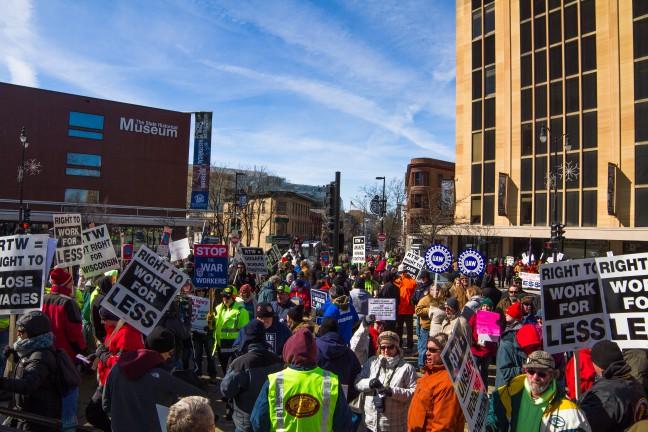A judge declined to issue a temporary injunction on a lawsuit against right-to-work Thursday.
Dane County Circuit Judge William Foust denied the injunction, ruling that there was not adequate proof the unions would suffer irreparable harm without it.
The Wisconsin AFL-CIO, along with United Steelworkers District 2 and Machinists Local Lodge 1061 filed a lawsuit against the right-to-work law last Tuesday. The complaint said right-to-work is an “unconstitutional taking of private property.”
As the lawsuit proceeds through the courts, the right-to-work law remains in effect with the denial of the injunction. In a statement, Phil Neuenfeldt, president of the Wisconsin AFL-CIO, said the ruling was an “injustice” to working people.
“Make no mistake, right-to-work will harm all of Wisconsin’s workers by driving down wages and weakening safety standards across all industries and workplaces,” Neuenfeldt said.
Right-to-work laws allow workers in unionized workplaces to opt out of paying union dues. Protesters against the law say right-to-work allows for freeloaders and dismantles private sector unions.
Neuenfeldt said despite the ruling, workers will continue to organize in their unions to speak out for better workplace conditions and wages for Wisconsin working families.
Donald Downs, a University of Wisconsin political science professor and advisor to the Herald, said the basis behind the lawsuit’s argument about the unconstitutional taking of private property was “speculative.”
“Usually it involves a law that takes a piece of your property or prevents you from using a part of your property,” Downs said. “I’ve never seen it apply to a case like this. That doesn’t mean that it’s necessarily going to lose, but I think it’s a stretch.”
The Wisconsin AFL-CIO rallied against the bill while it was in session, along with other union backers. Gov. Scott Walker signed the right-to-work law last Monday after the State Assembly passed it. Walker’s signature made Wisconsin the 25th right-to-work state.
Laurel Patrick, spokesperson for Walker, said in an email to The Badger Herald that they are confident the right-to-work law is constitutional and will be upheld.
“The court’s decision today is good news for Wisconsin’s workers who now have the freedom to choose whether or not they wish to pay union dues,” Patrick said. “This is a common-sense reform that empowers workers and encourages continued job growth in our state.”













